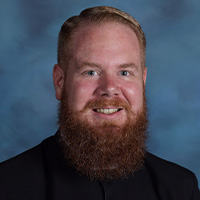CHARLOTTE — From a young age, Father Noah Carter has been deeply impacted by the beauty of Catholic liturgy. Father Carter
Father Carter
“My experience of the liturgy was always of something that obviously was not manmade – that we were just custodians and guardians of something that is much bigger than us and that can be traced all the way back to the apostles,” he said.
It’s fitting then that in his new role as the diocese’s director of liturgy he is overseeing changes in the Office of Divine Worship designed to support parishes and educate parishioners to participate more actively at Mass.
“One of the first things that the bishop asked me to do when I took on the office was to organize it in such a way that it would be an even greater resource to our parishes and to the liturgical life that is the ordinary means by which most parishioners interact with their churches,” Father Carter said.
The first change was to rename it the Office for Divine Worship. The more active word “for” reflects the bishop’s aim to be more engaged in parish liturgical efforts, Father Carter said, and to proactively tackle questions. He said it also reflects the vital role the office already plays in ensuring that plans for major renovation or construction of sacred spaces – churches, chapels or cemeteries – follow Church norms.
More than 10 parishes are currently working on major projects that involve sacred spaces, Father Carter said. “A large part of what the office is doing now is reviewing each stage of the plans.”
Because of that growing workload, the diocese will be hiring a full-time associate director of liturgy to manage day-to-day tasks, as well as form two commissions: one for Sacred Art and Architecture and one for Sacred Music, he said.
Envisioned by the Second Vatican Council, these commissions comprised of lay people and clergy will serve pastors, parishes and music programs by offering resources, answering questions and considering their respective liturgical elements.
Also new is the role of consultors, “priests and lay people with expertise in specified areas who would be a sounding board for those who work in this office and also serve as liaisons from the Office for Divine Worship to those different commissions,” Father Carter said.
In addition, he explained, “The hope is for the office to take some of the burden off of priests when it comes to training lectors and extraordinary ministers and that, in the future, we’ll be able to provide ongoing education by leveraging technology – not only for parish staff but also for the liturgical volunteers throughout the diocese.”
— Trish Stukbauer


